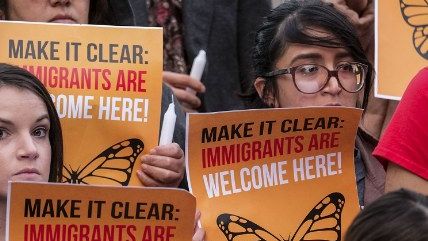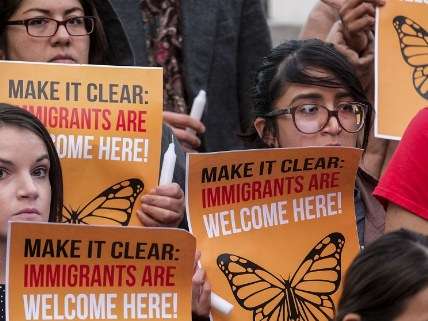Trump Order Opens New State-Level Immigration Law Fights
Texas and California represent polar opposites on federal cooperation.


As President Donald Trump seeks a crackdown against illegal immigration and particularly against sanctuary cities (municipalities that have policies of not checking the immigration status of citizens in police encounters), state legislators are figuring out how they want to respond.
Concepts of immigration and federalism as they play out in practice within the United States can create some unusual and polarizing dynamics. It becomes extremely obvious with states on the border to Mexico. While we see immigration-focused legislation from these states frequently, we're seeing a fresh round due to Trump's power.
California and Texas are taking completely opposite tacks (probably not a surprise to anybody). Some California legislators want to turn the entire state into a "sanctuary," and prohibit its cities and counties from cooperating with federal immigration officials. Texas wants to do almost the opposite, potentially punishing cities or counties that don't assist immigration officials in tracking down and deporting people in the country illegally. (And Trump has declared he may try to withhold federal money from California for its protecting of illegal immigrants, so every choice has the potential for official government punishment of some sort.)
California State Sen. Kevin De Leon (D-Los Angeles) has introduced legislation that would prohibit the state and (probably more importantly) local governments from spending money to assist in enforcing federal immigration laws in many situations. The law is broader than just covering police—it also covers schools and other government agencies. To be clear, it doesn't stop federal officials from coming into California and enforcing immigration policies, and if a judge issues a warrant for an immigrant's arrest for crimes, nothing there is going to change. The goal of De Leon's legislation is to essentially treat immigrants in California the same way they treat residents regardless of legal status. He's also calling for data collection rules that will ensure that information the state collects about immigration status is not shared outside the state of California.
Texas is actively attempting to stop its local governments from following in California's footsteps. Gov. Greg Abbot has cut about $2 million in law enforcement funds to Travis County (home of Austin) because it has just implemented a policy limiting what information local agencies share with federal immigration officials.
Texas State Sen. Charles Perry (R-Lubbock) has introduced SB4, state legislation that does the opposite of what California does. It mandates that law enforcement officials cooperate with immigration officials when asked to do so. It also requires that when a law enforcement officer arrests a person who is unable to provide proof of citizenry, that officer investigate to see whether that person is in the country illegally and both inform the judge or magistrate handling the case and record it in the person's case file. But the law also emphasizes that police cannot simply pull people over in their vehicles or perform searches of homes and business solely to determine whether folks are in the country legally.
Both laws are complicated and their potential impacts tough to evaluate. Read the California bill here. Read the Texas bill here. The California law doesn't prohibit communicating the immigration status of a specific individual to the feds, apparently in order to keep it from attempting to pre-empt federal law.
While divergent, what both state laws have in common is a desire for state governments to interfere in cities developing their own policies for the purposes of enforcing a highly politicized set of regulations over which many Americans have extremely polarized opinions. California's bill is obviously an attempt for coastal Democrats to overrule the attitudes of people living in the more conservative inside parts of the state. Many counties with smaller populations within the state went for Trump, and conservatism manifests in rural California in the same kind of desire for stricter immigration regulations as that in other Western states. If there weren't an interest in some communities it cooperating with immigration officials, the state wouldn't need to pass a law to stop it.
By contrast, what's happening in Texas is not unlike what happened in North Carolina, where the predominantly conservative state legislature passed a law to overrule Charlotte's City Council adding sexual orientation and gender identity to its antidiscrimination laws.
In that sense, both California's and Texas' bills should perhaps make libertarians uncomfortable, regardless of whether they support any particular outcome. Note that when California started decriminalizing—and then legalizing—marijuana, for a time the Department of Justice continued enforcing the law and putting people in prison. Criticism then was generally focused on federal behavior. Some local law enforcement and local governments assisted the feds. Some did not. Many cities made (and are still making) their own rules regarding growth and sales within the framework the state created. It's possible to be critical of municipal policy decisions while still not calling for some massive top-down state law to try to "fix" everything, especially when one political party has control over almost all the levers of power. If the citizens of Austin believed that illegal or undocumented immigrants were making their city more dangerous, they can certainly let their leaders know at the ballot box.
Regardless of whether either of those laws should be supported or ignored, absolutely nobody should support this awful proposed law in Arizona that would require not just drivers but passengers in vehicles to carry valid identification to show law enforcement on demand. Failure to have such identification would be a misdemeanor.
Arizona wouldn't allow police to just pull cars over just to check IDs, but it's very clearly an effort to give police more tools to intimidate and detain people regardless of their legal status. It's a very obvious "Papers, Please!" demand that a free citizenry should and must reject.


Show Comments (67)